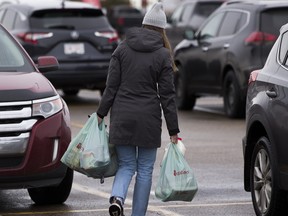In July, the price of paper bags will increase to $0.25 and reusable bags will rise to $2.00

Article content
As of July 1, Edmontonians will be paying more for their shopping bags, following the single-use plastics bylaw that came in effect in 2022.
Last July, Edmontonians started paying for their bags because of the city’s single-use item reduction bylaw. Other similar programs have been rolled out across the continent. With the fee increase this July, it marks one year since plastic bags were outlawed in the city. Here’s what you need to know about Edmonton’s ban on plastic bags.
Advertisement 2
Article content
How much will the price of bags increase?
When the bylaw went into effect last July, plastic shopping bags were no longer available. Customers looking for a bag over the past year were charged 15 cents for paper bags and $1 for a new reusable bag. Starting July 1, the price of paper bags will increase to 25 cents and the price of new reusable bags will rise to $2.
The price increase was scheduled within the bylaw when it went into effect last year.
What prompted the bylaw?
Environmental advocates had been pushing in Edmonton since 2018 for the City of Edmonton to take action against single-use plastic items.
In October 2022, the City of Edmonton officially acknowledged the effects of single-use plastics on “human and environmental health, as well as the aesthetics of the community.” The acknowledgement was part of the city’s reasoning for adopting the single-use plastics bylaw.
The single-use plastics bylaw aimed to reduce the amount of single-use items in the city’s waste management system, which coincided with Edmonton’s long-term strategy to reduce the portion of waste that is landfilled.
Article content
Advertisement 3
Article content
What is banned?
While the bags have snagged much of the attention, there were other items axed. Some other banned items include utensils, straws and polystyrene foam (Styrofoam) plates, cups and containers.
Recommended from Editorial
What are other cities doing?
While Edmonton hopped aboard the bandwagon of single-use item limitations last year, similar bylaws have been in place in other places for several years.
Montreal has had a ban of plastic bags since 2018. In January, Banff chose to go down the road of least plasticity, banning plastic shopping bags in the town. Back in 2014, the entire state of California tried banning single-use plastic bags, but the law was suspended by a referendum and didn’t go into effect until 2016 after Proposition 67, which pushed the law through.
Calgary tried its hand at banning single-use items including plastic bags, but it barely lasted two weeks. The ban went into effect on Jan. 16 but by Jan. 30, due to public outcry, Calgary city council started the process of repealing its bylaw, which was officially halted in May.
Advertisement 4
Article content
What do the advocates and the detractors have to say?
For Sean Stepchuk, director and co-founder of Waste Free Edmonton, the bylaw and the increase in charges is “important.” Stepchuk said the increase in bag charges was communicated to residents from the start and, although a paper bag may seem from the outset as positive, it still has an environmental impact.
“When it comes to litter, it’s much better to have paper out in the environment than it is to have plastic. But there’s still an environmental impact associated with paper bags,” said Stepchuk.
The increase in price for reusable bags, Stepchuk said, was an effective method of ensuring that reusable bags don’t also become single-use.
Common Sense Edmonton is an advocacy group that was vocally opposed to the ban from the start. In a page dedicated to petitioning the city to “Stop The Plastic Ban,” the group dismissed the bylaw on the grounds that single-use plastics only account for a fraction of the world’s waste, plastic bags aren’t bad for the environment, and questioned the practicality of reusable bags.
Do bans actually work?
Advertisement 5
Article content
The City of Edmonton has yet to release any information about the progress of its bans on reducing waste, but highlighted its aim to reduce the “number of regulated single-use items used in Edmonton by 20 per cent per person.”
On a positive note, in January the Massachusetts Public Information Research Group released a study on plastic bag bans, which estimated that on average, plastic bag bans eliminated 300 bags per person, per year. The study was conducted by examining data from across the United States and showed that even five locations with plastic bag bans cut consumption by six billion bags per year.
Article content





